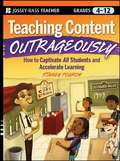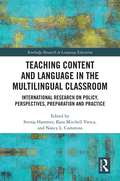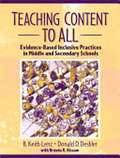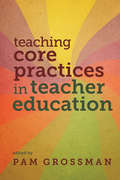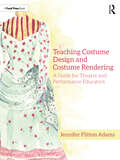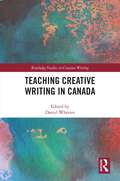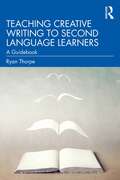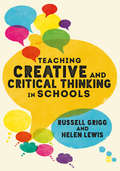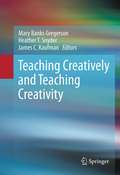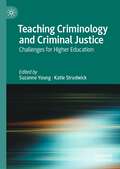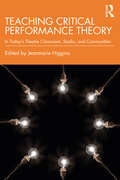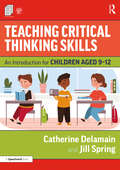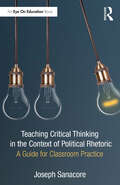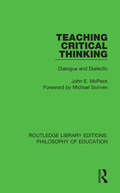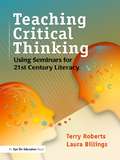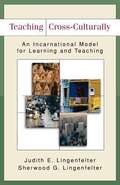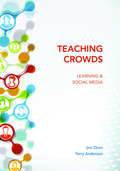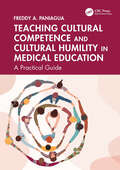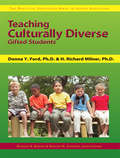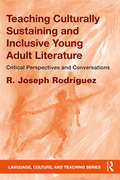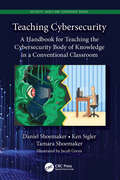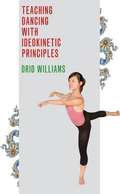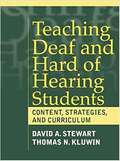- Table View
- List View
Teaching Content Outrageously
by Stanley PogrowA powerful instructional method for "hooking" students on academic learning Drawing from a teaching model designed to banish boredom and student apathy, this book explains how dramatic practices can serve as powerful tools for enlivening lessons and captivating students, even the most resistant learners. Filled with intriguing classroom examples, Pogrow shows how any teacher can make use of dramatic techniques, such as surprise, humor, fantasy, role plays, games, and simulations to create standards-based content lessons that are riveting, effective, and meaningful. The author explains how to design such lessons into any content area. Stanley Pogrow (San Francisco, CA), a noted authority on teaching practices for disadvantaged students, is professor of educational leadership at San Francisco State University, where he coordinates the Educational Leadership for Equity Program.
Teaching Content and Language in the Multilingual Classroom: International Research on Policy, Perspectives, Preparation and Practice (Routledge Research in Language Education)
by Nancy L. Commins Svenja Hammer Kara Mitchell ViescaThis book brings together research from six different countries across three continents where teacher educators and policy makers are addressing the under-preparation of content teachers to work effectively with multilingual learners. By highlighting this relatively young field of research at an international level, the book advances the research-based knowledge of the field and promotes international research relationships and partnerships to better support the education of multilingual learners and their teachers. The chapters represent high-quality empirical qualitative, quantitative, and mixed methods studies about pre-service and in-service teachers. Comprising four sections, each represents a critical aspect of the equitable teaching of multilingual learners. All the research was conducted in countries that belong to OECD (Organisation for Economic Co-operation and Development) and the PISA (Programme for International Student Assessment) enabling the reader to compare contexts and outcomes. This book will be of particular interest to academics, researchers, and post-graduate students in the fields of language education, teacher education, and education for multilingual learners. It will be of great value to anyone concerned with equity and social justice for multilingual learners whose languages, cultural practices, and resources are often overlooked and/or marginalized in the schools they attend.
Teaching Content to All: Evidence-based Inclusive Practices in Middle and Secondary Schools
by Donald D. Deshler B. Keith Lenz Brenda R. KissamTeaching Content to All includes what every secondary teacher needs to know about instructing students with different learning needs. <P><P> It helps secondary teachers understand academic diversity among students and then plan for and implement instruction that reaches all students. <P><P> The text addresses the unique challenges faced by secondary educators committed to inclusion and to meeting standards for all students. Teaching Content to All explains research-based teaching techniques and strategies based on understanding instructional goals rather than simply implementing isolated teaching tools. <P><P> Examples are heavily oriented toward the content areas, and the planning and teaching routines it presents are easily adaptable across the curriculum by both general and special educators. The material can be adapted for the elementary grades.
Teaching Controversial Political Issues in the Age of Social Media: Research from Israel
by Rakefet Erlich Ron Shahar GindiUsing Israel as a case study, this book examines teachers’ approaches to Controversial Political Issues (CPI) in the classroom. The book focuses on the democratic responsibilities that teachers face in an era where social media use is ubiquitous, and polarization and fake news are increasingly common. Presenting original research on the topic and developing a pedagogical framework for dealing with controversial issues in a sensitive and effective manner, this accessible volume highlights social-emotional learning approaches and considers a broad definition of CPI to include issues of racism, religion, political differences, multiculturalism, and Jewish–Arab relations. Using the results of an in-depth research project foregrounding personal experience, the book explores situational accounts of teachers from a diverse range of subject disciplines and different minority–majority group settings to present comparative evidence from European contexts. Offering concrete suggestions for ways of dealing with controversial political issues and volatile remarks that are grounded in research, this timely book will be highly relevant for researchers, students, and educators in the fields of social studies, democratic and peace education, citizenship education, race and education, and educational politics.
Teaching Core Practices in Teacher Education (Core Practices in Education Series)
by Pam GrossmanIn Teaching Core Practices in Teacher Education, Pam Grossman and her colleagues advocate an approach to practice-based teacher education that identifies &“core practices&” of teaching and supports novice teachers in learning how to enact them competently. Examples of core practices include facilitating whole-class discussion, eliciting student thinking, and maintaining classroom norms. The contributors argue that teacher education needs to do more to help teachers master these professional skills, rather than simply emphasizing content knowledge. Teaching Core Practices in Teacher Education outlines a series of pedagogies that teacher educators can use to help preservice students develop these teaching skills. Pedagogies include representations of practice (ways to show what this skill looks like and break it down into its component parts) and approximations of practice (the ways preservice teachers can try these skills out as they learn). Vignettes throughout the book illustrate how core practices can be incorporated into the teacher education curriculum. The book draws on the work of a consortium of teacher educators from thirteen universities devoted to describing and enacting pedagogies to help novice teachers develop these core practices in support of ambitious and equitable instruction. Their aim is to support teacher educator learning across institutions, content domains, and grade levels. The book also addresses efforts to support teacher learning outside formal teacher education programs.Contributors Chandra L. Alston Andrea Bien Janet Carlson Ashley Cartun Katie A. Danielson Elizabeth A. Davis Christopher G. Pupik Dean Brad Fogo Megan Franke Hala Ghousseini Lightning Peter Jay Sarah Schneider Kavanagh Elham Kazemi Megan Kelley-Petersen Matthew Kloser Sarah McGrew Chauncey Monte-Sano Abby Reisman Melissa A. Scheve Kristine M. Schutz Meghan Shaughnessy Andrea Wells
Teaching Costume Design and Costume Rendering: A Guide for Theatre and Performance Educators
by Jennifer Flitton AdamsTeaching Costume Design and Costume Rendering: A Guide for Theatre and Performance Educators clarifies the teaching process for Costume Design and Costume Rendering courses and offers a clear and tested path to success in the classroom. Drawing on the knowledge and experience of the author’s twenty-five years of teaching as well as many decades of work by multiple other educators, this book provides a clear roadmap for teaching these two popular Theatre courses. It includes information on pedagogical theory, creating syllabi, preparing and structuring classes, crafting lectures, and analyzing students’ work, with a heavy focus on specific teaching projects that have been proven to work in the classroom. All aspects of teaching costume design and rendering are considered, including body awareness, cultural sensitivities, script analysis, elements and principles of design, psychology of dress, choosing fabrics, period styling, and requirements of dance costumes. Included in the appendices are sample syllabi, and additional reading and research resources. Teaching Costume Design and Costume Rendering is a guide for theatre and performance educators ranging from secondary education to undergraduate programs and graduate studies. It is a valuable resource both for costume educators approaching costume design and rendering classes for the first time and for experienced instructors looking for new material for these courses.
Teaching Creative Writing in Canada (Routledge Studies in Creative Writing)
by Darryl WhetterTeaching Creative Writing in Canada maps the landscape of Creative Writing programmes across Canada. Canada’s position, both culturally and physically, as a midpoint between the two major Anglophone influences on Creative Writing pedagogyy—the UK and the USA—makes it a unique and relevant vantage for the study of contemporary Creative Writing pedagogy.Showcasing writer-professors from Canada’s major Creative Writing programmes, the collection considers the climate-crisis, contemporary workshop scepticism, curriculum design, programme management, prize culture, grants and interdisciplinarity. Each chapter concludes with field-tested writing advice from many of Canada’s most influential professors of fiction, poetry, creative nonfiction and drama.This authoritative volume offers an important national perspective on contemporary and timeless issues in Creative Writing pedagogy and their varied treatment in Canada. It will be of valuable to other creative teachers and practitioners, those with an interest in teaching and learning a creative art and anyone working on cultural and educational landscapes.
Teaching Creative Writing to Second Language Learners: A Guidebook
by Ryan ThorpeThis timely and accessible book offers engaging guidance to teachers of second language students on teaching creative writing in their classrooms. Creative writing is a tool that can inspire second language learners to write more, play with language, and enjoy and improve not only their writing, but also their speaking, listening, and reading skills. Addressing the expectations and perceptions of writing in another language, Thorpe demonstrates how to foster successful creative writing environments and teach and assess creative writing in a way that is tailored to the distinct needs of non-native speakers. Covering key topics such as cultural storytelling, voice, genre, and digital composition, assessment, and more, Thorpe shares successful creative writing instructional practices informed by current research in creative writing and second language education. Each chapter includes insights, advice, and student examples that can help new teachers take their first steps in more reflective second language creative writing classroom. An invaluable resource for instructors of non-native students and an ideal text for pre-service teachers in courses in TESOL, writing instruction, and applied linguistics, this book invites you to use creative writing not only as a successful method for teaching L2 writing, but also as a way to improve student motivation and output, for more effective language learning.
Teaching Creative and Critical Thinking in Schools
by Helen Lewis Dr Russell GriggHow do we encourage children to think deeply about the world in which they live? Research-based and highly practical, this book provides guidance on how to develop creative and critical thinking through your classroom teaching. Key coverage includes: · Classroom-ready ideas to stimulate high-order thinking · How to think critically and creatively across all areas of the curriculum · Case studies from primary, secondary and special schools · Philosophical approaches that give pupils the space to think and enquire This is essential reading for anyone on university-led and schools-based primary and secondary initial teacher education courses including undergraduate (BEd, BA QTS), postgraduate (PGCE, SCITT), School Direct, Teach First and employment-based routes and also anyone training to work in early years settings.
Teaching Creative and Critical Thinking in Schools
by Helen Lewis Russell GriggHow do we encourage children to think deeply about the world in which they live? Research-based and highly practical, this book provides guidance on how to develop creative and critical thinking through your classroom teaching. Key coverage includes: · Classroom-ready ideas to stimulate high-order thinking · How to think critically and creatively across all areas of the curriculum · Case studies from primary, secondary and special schools · Philosophical approaches that give pupils the space to think and enquire This is essential reading for anyone on university-led and schools-based primary and secondary initial teacher education courses including undergraduate (BEd, BA QTS), postgraduate (PGCE, SCITT), School Direct, Teach First and employment-based routes and also anyone training to work in early years settings.
Teaching Creatively and Teaching Creativity
by James C. Kaufman Mary Banks Gregerson Heather T. SnyderCreative teaching as well as teaching creativity are cutting edge issues in psychology today as recent academic and popular media coverage has shown. This volume expands on that interest with chapter authors drawn from interdisciplinary areas. It includes examples of creatively teaching across the education system, including preschool, K-12, undergraduate, and graduate level education. The variety of subjects covered by the chapters include psychology,math, science, and reading. In addition to creative teaching which may lead to enhanced learning and achievement in students, as well enhanced creativity,another focus is teaching with the objective to enhance creativity.
Teaching Criminology and Criminal Justice: Challenges for Higher Education
by Suzanne Young Katie StrudwickThis book addresses the challenges within teaching Criminology and Criminal Justice, for students studying and academics involved in designing and delivering courses at an undergraduate and postgraduate level. The book highlights a number of contemporary issues through a wide context of themes and reflections of practice. The chapters are arranged in thematic parts: firstly ‘the challenges of diversity and inclusion’ secondly ‘challenges of creating authentic learning environments', and lastly ‘the challenge of creating transformative conversation’. These themes discuss different teaching approaches and present materials which address questions relevant for meeting the challenges. The book focuses on the role and impact of teaching Criminology and Criminal Justice in the real world and explores debates which have autonomy in their questioning and overlapping themes. The narratives reflect upon others’ experiences and explore transformative learning and innovation in Criminology and Criminal Justice.
Teaching Critical Performance Theory: In Today’s Theatre Classroom, Studio, and Communities
by Jeanmarie HigginsTeaching Critical Performance Theory offers teaching strategies for professors and artist-scholars across performance, design and technology, and theatre studies disciplines. The book’s seventeen chapters collectively ask: What use is theory to an emerging theatre artist or scholar? Which theories should be taught, and to whom? How can theory pedagogies shape and respond to the evolving needs of the academy, the field, and the community? This broad field of enquiry is divided into four sections covering course design, classroom teaching, the studio space, and applied theatre contexts. Through a range of intriguing case studies that encourage thoughtful theatre practice, this book explores themes surrounding situated learning, dramaturgy and technology, disability and inclusivity, feminist approaches, race and performance, ethics, and critical theory in theatre history. Written as an invaluable resource for professionals and postgraduates engaged in performance theory, this collection of informative essays will also provide critical reading for those interested in drama and theatre studies more broadly.
Teaching Critical Thinking Skills: An Introduction for Children Aged 9–12
by Catherine Delamain Jill SpringThis practical teaching resource has been designed to give children aged 9–12 the basic tools required to challenge some of the conflicting information which they may encounter in everyday life. With increasing exposure to modern information technology and social media, amongst other things, children are increasingly exposed to misleading information that can seriously influence their worldview and self-esteem. The sooner they are helped to approach some of this material with a critical eye, the better they will be able to make independent judgements and resist undue persuasion. Key features of this book include: • Short texts designed to give opportunities for critical examination, created to be points of discussion with individuals, groups or whole classes • Topics covering seven areas of critical thought, ordered in level of difficulty, including finding contradictions, and detecting bias and fake news • Supporting teacher prompts and questions, as well as photocopiable resources without prompts The ability to question and evaluate information is an essential life skill, as well as a key skill for academic learning, yet it remains one of the most challenging aspects of comprehension to teach. This is a vital text for teachers, teaching assistants and other professionals looking to develop critical thinking skills in their students.
Teaching Critical Thinking in the Context of Political Rhetoric: A Guide for Classroom Practice
by Joseph SanacoreDuring the past several decades, there has been a blitz of information, sometimes referred to as the knowledge explosion, and students have struggled in their attempts to distinguish true, fake, and terribly biased information, especially regarding political issues. This book highlights the value of critical thinking as a way to navigate this difficult and frustrating terrain, so that students grow and develop as knowledgeable, independent thinkers. To promote this growth, the book offers thoughtful, evidence-based advice for teachers to support students’ deep thinking as it relates to real-world contexts. Strategies presented include student reflection based on experience, moving from narrow to broader perspectives, and using graphic organizers to build and activate knowledge before, during, and after instructional activities. With the instructional guidance and activities presented in this short, easy-to-apply volume, teachers can give students the tools they need to negotiate the often-murky waters of political communication.
Teaching Critical Thinking: Dialogue and Dialectic (Routledge Library Editions: Philosophy of Education #13)
by John E. McPeckThis book, first published in 1990, takes a critical look at the major assumptions which support critical thinking programs and discovers many unresolved questions which threaten their viability. John McPeck argues that some of these assumptions are incoherent or run counter to common sense, while others are unsupported by the available empirical evidence. This title will be of interest to students of the philosophy of education.
Teaching Critical Thinking: Using Seminars for 21st Century Literacy
by Laura Billings Terry RobertsHelp students meet today’s literacy demands with this new book from Terry Roberts and Laura Billings. The authors show how a seminar approach can lead students deeper into a text and improve their speaking, listening, and writing skills, as recommended by the Common Core State Standards. Roberts and Billings provide easy-to-follow information on implementing Paideia Seminars, in which students discuss a text and ask open-ended questions about it. When teachers use this lesson format, students are exposed to a wide range of increasingly complex texts. They also learn how to collaborate, talk about, and reflect on what they’re reading, to make meaning independently and together. Seminars can be done in English class and across the curriculum, using social studies documents or math problems as the texts under discussion. Teaching Critical Thinking also offers an array of practical resources: teacher lesson plans student samples a list of possible ideas and values for discussion a guide to asking good questions during a seminar six full seminar plans (including the texts), covering literature, social studies, and science topics
Teaching Cross-Culturally: An Incarnational Model for Learning and Teaching
by Sherwood G. Lingenfelter Judith E. LingenfelterThe goal of this book is to help teachers understand their own culture of teaching and learning and also equip teachers to become effective learners in another cultural context, with specific focus on learning for teaching.
Teaching Crowds: Learning and Social Media
by Terry Anderson Jon DronWithin the rapidly expanding field of educational technology, learners and educators must confront a seemingly overwhelming selection of tools designed to deliver and facilitate both online and blended learning. Many of these tools assume that learning is configured and delivered in closed contexts, through learning management systems (LMS). However, while traditional "classroom" learning is by no means obsolete, networked learning is in the ascendant. A foundational method in online and blended education, as well as the most common means of informal and self-directed learning, networked learning is rapidly becoming the dominant mode of teaching as well as learning. In Teaching Crowds, Dron and Anderson introduce a new model for understanding and exploiting the pedagogical potential of Web-based technologies, one that rests on connections — on networks and collectives — rather than on separations. Recognizing that online learning both demands and affords new models of teaching and learning, the authors show how learners can engage with social media platforms to create an unbounded field of emergent connections. These connections empower learners, allowing them to draw from one another’s expertise to formulate and fulfill their own educational goals. In an increasingly networked world, developing such skills will, they argue, better prepare students to become self-directed, lifelong learners.
Teaching Cultural Competence and Cultural Humility in Medical Education: A Practical Guide
by Freddy A. PaniaguaTraining in multicultural issues is an area of increasing focus in medical education internationally. In the United States specifically, the inclusion of the topic in training programs is among the key criteria established by the Liaison Committee on Medical Education (LCME) for approval of schools of medicine, where Standard 7.6 deals with "Structural Competence, Cultural Competence, and Health Inequities." This new textbook provides a culturally sensitive framework to address the major elements in the LCME Standard 7.6 and to address related requirements for including multicultural issues in the curriculums of medical schools around the world.Key Features The first book in the field to provide a framework to help approved medical schools and those in the submission process for approval in the United States to respond appropriately to Standard 7.6 in the LCME This framework also supports the design of culturally sensitive curriculums in medical schools outside the United States Provides specific guidelines to equip future physicians with the skills to take the culturally sensitive approaches they must use when assessing, diagnosing, and treating culturally diverse patients in order to ensure optimal outcomes for patients Helps medical educators and schools to specify where and how in the curriculum students are best trained to become culturally competent and the need also to display attributions of cultural humility during clinical encounters with clients/patients With a practical approach, the book provides invaluable hands-on guidance to students seeking to develop their skills, knowledge, and competence in this area. Additionally, by specifying where and how in the curriculum students can be trained to be culturally competent, the book serves as an essential reference for educators and medical schools seeking support in the development and implementation of a culturally appropriate curriculum.
Teaching Culturally Diverse Gifted Students
by Donna Y. Ford H. Richard MilnerThe 21st century is witnessing an unprecedented change in its demographics, especially in school settings. Like no other time in history, our nation is becoming overwhelmingly diverse, with Hispanic Americans and African Americans increasing in numbers. However, as our nation and schools become more diverse, we have witnessed little demographic changes relative to diversity in gifted education classes, programs, and services. This guide offers practical advice for building gifted education programs that serve a rich diversity of students. This book features an overview of multicultural gifted education, effective teaching strategies and best practices that support a diverse population of students, and an effective model for building a diverse, successful gifted program. The book also includes a sample curriculum and an extensive listing of print and Web-based recommended resources. This is one of the books in Prufrock Press' popular Practical Strategies Series in Gifted Education. This series offers a unique collection of tightly focused books that provide a concise, practical introduction to important topics concerning the education of gifted children. The guides offer a perfect beginner's introduction to key information about gifted and talented education.
Teaching Culturally Sustaining and Inclusive Young Adult Literature: Critical Perspectives and Conversations (Language, Culture, and Teaching Series)
by R. Joseph RodríguezIn this book, Rodríguez uses theories of critical literacy and culturally responsive teaching to argue that our schools, and our culture, need sustaining and inclusive young adult (YA) literature/s to meet the needs of culturally and linguistically diverse readers and all students. This book provides an outline for the study of literature through cultural and literary criticism, via essays that analyze selected YA literature (drama, fiction, nonfiction, and poetry) in four areas: scribal identities and the self-affirmation of adolescents; gender and sexualities; schooling and education of young adult characters; and teachers’ roles and influences in characters’ coming of age. Applying critical literacy theories and a youth studies lens, this book shines a light on the need for culturally sustaining and inclusive pedagogies to read adolescent worlds. Complementing these essays are critical conversations with seven key contemporary YA literature writers, adding biographical perspectives to further expand the critical scholarship and merits of YA literature.
Teaching Cybersecurity: A Handbook for Teaching the Cybersecurity Body of Knowledge in a Conventional Classroom (Security, Audit and Leadership Series)
by Ken Sigler Daniel Shoemaker Tamara ShoemakerLet’s be realistic here. Ordinary K-12 educators don’t know what "cybersecurity" is and could probably care less about incorporating it into their lesson plans. Yet, teaching cybersecurity is a critical national priority. So, this book aims to cut through the usual roadblocks of confusing technical jargon and industry stovepipes and give you, the classroom teacher, a unified understanding of what must be taught. That advice is based on a single authoritative definition of the field. In 2017, the three societies that write the standards for computing, software engineering, and information systems came together to define a single model of the field of cybersecurity. It is based on eight building blocks. That definition is presented here. However, we also understand that secondary school teachers are not experts in arcane subjects like software, component, human, or societal security. Therefore, this book explains cybersecurity through a simple story rather than diving into execution details. Tom, a high school teacher, and Lucy, a middle school teacher, are tasked by their district to develop a cybersecurity course for students in their respective schools. They are aided in this by "the Doc," an odd fellow but an expert in the field. Together they work their way through the content of each topic area, helping each other to understand what the student at each level in the educational process has to learn. The explanations are simple, easy to understand, and geared toward the teaching aspect rather than the actual performance of cybersecurity work. Each chapter is a self-contained explanation of the cybersecurity content in that area geared to teaching both middle and high school audiences. The eight component areas are standalone in that they can be taught separately. But the real value lies in the comprehensive but easy-to-understand picture that the reader will get of a complicated field.
Teaching Dancing with Ideokinetic Principles
by Drid WilliamsIn examining ideokinesis and its application to the teaching and practice of dancing, Drid Williams introduces readers to the work of Dr. Lulu Sweigard (1895–1974), a pioneer of ideokinetic principles. Drawing on her experiences during private instructional sessions with Sweigard over a two-year span, Williams discusses methods using imagery for improving body posture and alignment for ease of movement. Central to Williams's own teaching methods is the application of Sweigard's principles and general anatomical instruction, including how she used visual imagery to help prevent bodily injuries and increasing body awareness relative to movement. Williams also emphasizes the differences between kinesthetic (internal) and mirror (external) imagery and shares reactions from professional dancers who were taught using ideokinesis. Williams's account of teaching and practicing ideokinesis is supplemented with essays by Sweigard, William James, and Jean-Georges Noverre on dancing, posture, and habits. Teaching Dancing with Ideokinetic Principles offers an important historical perspective and valuable insights from years of teaching experience into how ideokinesis can shape a larger philosophy of the dance.
Teaching Deaf And Hard Of Hearing Students: Content, Strategies, And Curriculum
by David A. Stewart Thomas N. KluwinThis highly practical reference for both pre-service and in-service teachers of the deaf and hard of hearing covers methods of teaching and other issues related to the teaching of deaf students. Teaching Deaf and Hard of Hearing Students takes a practical look at the challenges of teaching subject matter to deaf children. The book gives suggestions about what teachers can do in the classroom that will make a positive difference in how their deaf students learn. It emphasizes providing teachers with a framework to design instructions that meet the educational needs of their deaf students. The principles upon which instructional planning proceeds are applicable to deaf students at all grade levels; thus, the book is suitable for teachers at the elementary through high school levels. These principles are diverse but revolve around four central themes: 1) Creating authentic experiences; 2) Integrating vocabulary development; 3) Creating opportunities for self-expression; and 4) Providing deaf role models. When applicable, distinctions are made between the various instructionalroles of teachers in self-contained classrooms, resource room teachers, and itinerant teachers, as well as general education teachers who have deaf students in their classrooms. Issues relating to diversity, discipline, and disabilities are reviewed from a pragmatic perspective. Ideas are then presented about how teachers can address these issues through instruction. Finally, strategies are provided for involving the family in the education of their deaf children, including exercises for increasing family awareness of the learning challenges their deaf children face. Practical ideas about how teachers can empower parents in the learning process are featured. Educators of deaf and hard of hearing students.
